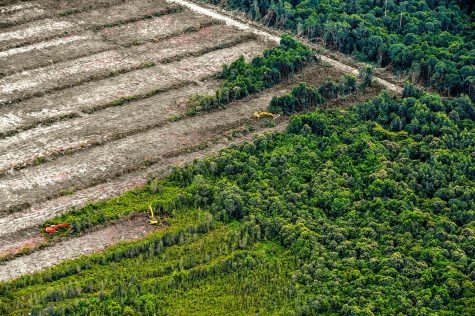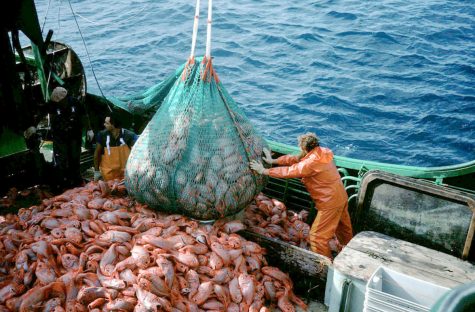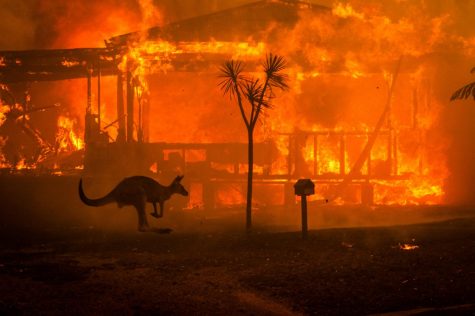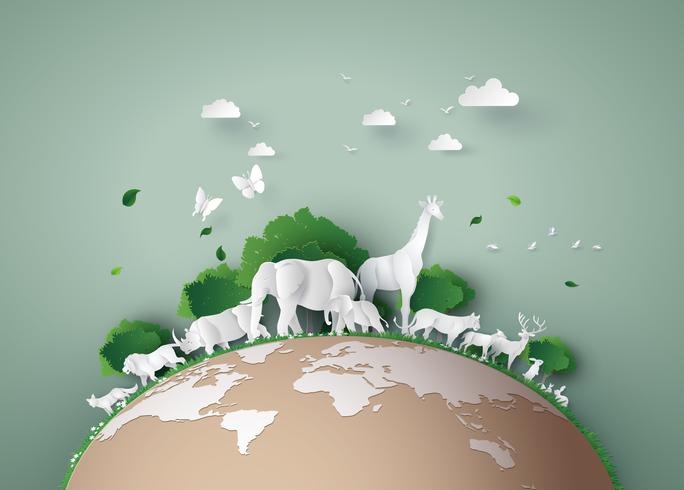World Wildlife Day
In December of 2013, the United Nations (UN) declared March 3rd World Wildlife Day. This day was established to promote awareness for the world’s wild fauna and flora, as well as the dangers that these wild fauna and flora face in our ever-evolving planet.
Our ever-evolving planet is periled by the results of both global warming driven by human emission of greenhouse gases and the resulting large-scale shift in weather patterns. So, how do we create a future in which both humanity and nature can thrive? This is the most pressing question of our era. In the next few decades, humanity needs to achieve the impossible.
 In the early days of humankind, the perils of nature jeopardized our very survival. So, we decided to challenge this reality by learning how to tame nature through farming. As our population grew, so did our demands. In the process of fulfilling our demands, we altered the Earth’s surface. We built dams to protect our cities, cut down forests to build our farmlands. We have transformed our world so profoundly that scientists have decided that Earth has entered a new phase of its existence: anthropocene, the age of humans. Instead of nature determining the survival of humankind, humankind now determines the survival of nature.
In the early days of humankind, the perils of nature jeopardized our very survival. So, we decided to challenge this reality by learning how to tame nature through farming. As our population grew, so did our demands. In the process of fulfilling our demands, we altered the Earth’s surface. We built dams to protect our cities, cut down forests to build our farmlands. We have transformed our world so profoundly that scientists have decided that Earth has entered a new phase of its existence: anthropocene, the age of humans. Instead of nature determining the survival of humankind, humankind now determines the survival of nature.
The underlying issue is that our planet is growing less and less wild. Humankind has cleared three trillion trees, cultivated half its fertile land, and, in the last fifty years, the population of wild animals has reduced by sixty percent. Our wildlife and wildlands have been replaced by ourselves, our cities, our domesticated animals, and domesticated plants. Today, we and the animals we have domesticated account for ninety-six percent of the mass of mammals and seventy percent of the birds on Earth. There is barely any true wilderness left on our planet.

This immense loss of biodiversity is the single largest problem we face. Our planet needs its wildlife, like every being, no matter how small, plays its own part in the survival of our Earth. A less-wild world is less able to provide for the needs of both humankind and the other beings we share a home with. As seen with the frigid Texas freeze, and the wildfires of the scorching California summers, and the melting of the polar ice caps, a decreasingly wild world is growing less and less able to have dependable weather patterns for our seasons. In addition, one million of our species are threatened by extinction. Fifty percent of grasslands, forests, and coral reefs have disappeared, as well as eighty percent of our planet’s wetlands — jeopardizing the survival of species that call these habitats home. To halt the further extinction of endangered species, we must prevent threats from trafficking, poaching, and overexploitation. Biodiversity brings stability to our planet, and stability is what we need to achieve the balance between humankind and nature.
We need to “re-wild” our planet — but how? There are four key things we can do to restore the balance between humankind and nature: rethink the way we use energy, revolutionize the way we eat food, improve our ocean management, and encourage the development of wildlands. Through an energy revolution, humans can work to phase out fossil fuels and replace them with renewable sources of energy, resulting in the de-acidification of the oceans, the slowing of the planet’s warming, and cleaner air for all of earth’s creatures. With a food revolution, humankind must upgrade to more efficient food production, as well as reduce our consumption of meat. This would require much less space to provide for human agricultural needs, providing more land for wild habitats to develop. This would decrease deforestation for the sake of farmland and greatly reduce our freshwater demand. In addition, we must work together to properly manage our ocean. Through a global network of no-fish zones, international treaties, and greater waste management, we can work to restore the health of our oceans. In order to re-wild our planet, we must embrace the surviving wildlife and encourage the redevelopment of natural and wildlife lands.
 Environmentalist Edward Abbey once said, “the idea of wilderness needs no defense, it only needs defenders.” Together we can work together to defend our planet’s wildlife. The fate of our Earth is in the hands of humankind. It is time for us to uphold our moral and historical responsibilities. It is time for us to rebuild and revitalize the place we, and billions of other creatures, call home. This March, honor World Wildlife Day by working to re-wild our planet. Only then can we restore the balance between humankind and nature.
Environmentalist Edward Abbey once said, “the idea of wilderness needs no defense, it only needs defenders.” Together we can work together to defend our planet’s wildlife. The fate of our Earth is in the hands of humankind. It is time for us to uphold our moral and historical responsibilities. It is time for us to rebuild and revitalize the place we, and billions of other creatures, call home. This March, honor World Wildlife Day by working to re-wild our planet. Only then can we restore the balance between humankind and nature.
All statistics used in this article are from WWF International.

Siona Manocha, a senior, has attended Keystone School since kindergarten. Through The Keynote, Siona employs the use of visual art and media to highlight...

